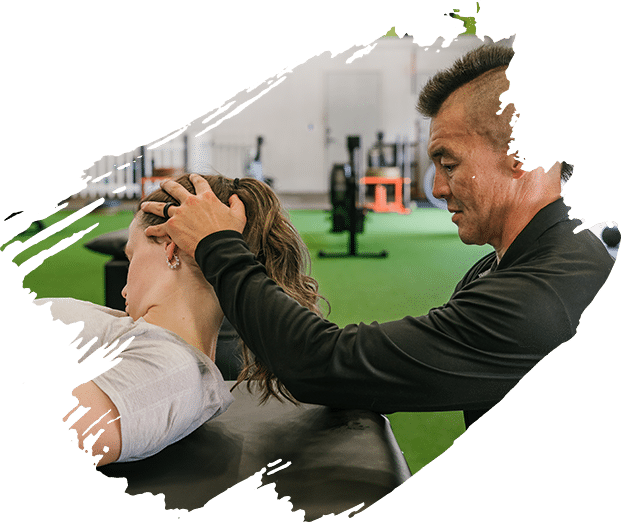Are 1 Lb. Of Fat And 1 Lb. Of Muscle Equal?
 Do you want to look your best? People often focus on losing weight, but they also need to focus on the fat to muscle tissue ratio. The two aren't equal. A biological female weighing 130 pounds but has over 25% body fat will look far heavier than a counterpart weighing the same whose body fat is 14%. Even though the two are the same weight, the one with more muscle will look thinner.
Do you want to look your best? People often focus on losing weight, but they also need to focus on the fat to muscle tissue ratio. The two aren't equal. A biological female weighing 130 pounds but has over 25% body fat will look far heavier than a counterpart weighing the same whose body fat is 14%. Even though the two are the same weight, the one with more muscle will look thinner.
Muscle tissue is denser than fat tissue.
If you created a container to hold precisely one pound of fat tissue and a container to hold exactly one pound of muscle tissue, the one containing fat tissue would have to be bigger than the one containing muscle. A pound of fat tissue isn't as dense as muscle tissue and requires more space to hold a pound. It weighs less per cubic inch. It's why working out makes you look thinner even if you don't lose a single pound. You've built a pound of muscle and lost a pound of fat. You'll look thinner the more muscle you have.
Fat plays a different role in the body than muscle does.
Fat is stored energy that is ready to use for energy if there's not enough food. Muscle performs a different function. It's necessary for movement and that movement can keep the body healthier and bones strong. Muscle tissue requires more calories for maintenance than fat tissue does. The more muscle tissue you have, the higher your metabolism and the more calories you'll burn even when you're at rest.
Too much fat plays a negative role in health.
If you're extremely muscular and at the high end of the weight chart, there's normally no effect on your health. In fact, you'll probably be healthier than the average person within the normal weight range. You'll have lower blood glucose levels, less inflammation, and better insulin sensitivity. Excess fat plays a different role in health, particularly if it's around the waist. A higher percentage of fat can increase the risk of heart disease, some types of cancer, metabolic disorders, and diabetes.
- You'll look better with a healthier fat to muscle tissue ratio. You'll have a more defined body mass that doesn't jiggle when you move. It doesn't matter what body shape you have lean; toned muscles add to its appearance.
- Never try to eliminate all fat from the body. Fat plays an important role too. It's a matter of ensuring you don't have too much.
- Diet alone isn't enough to achieve a good balance of body fat and muscle. Exercise that builds muscle tissue improves body composition. Strength-building workouts and a healthy diet can reduce body fat while providing many health benefits.
- If you're doing strength training to build muscles, you're also increasing your output of calories, which can lead to even more weight loss. While cardio exercises are important, the calories burned come from both muscle and fat.
For more information, contact us today at Habitat Health & Fitness


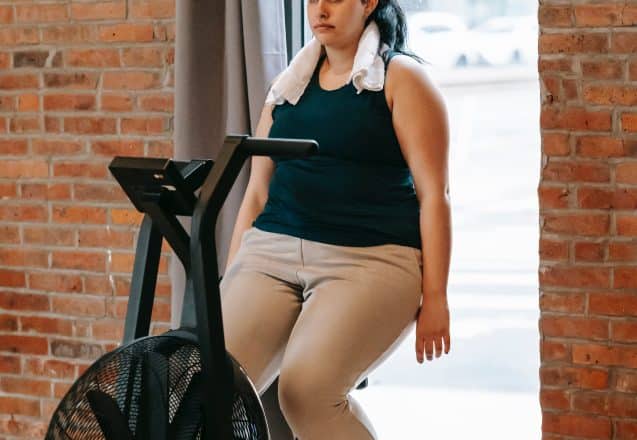
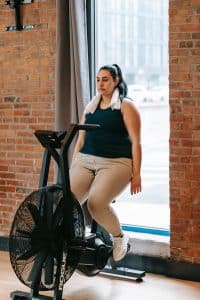 People who work out at Habitat Health and Fitness know that continuously eating more calories than you require causes weight gain. It's the first thing most overweight people learn about weight control. What most people don't search for are signs you actually need to eat more calories. It may sound like a dream come true, but it isn't. It's just as hard to gain weight as it is to lose it. Too few calories can interfere with the functions of the body and lead to critical health issues.
People who work out at Habitat Health and Fitness know that continuously eating more calories than you require causes weight gain. It's the first thing most overweight people learn about weight control. What most people don't search for are signs you actually need to eat more calories. It may sound like a dream come true, but it isn't. It's just as hard to gain weight as it is to lose it. Too few calories can interfere with the functions of the body and lead to critical health issues.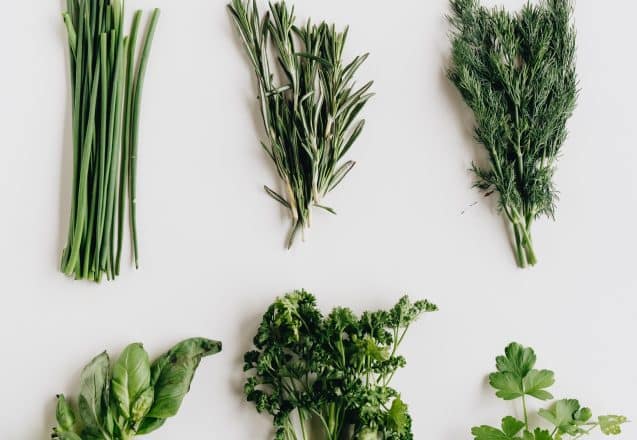
 Clients at Habitat Health in Lakeland, FL, love working out. They say it helps them decrease stress. There are often stressful times when exercising isn't possible. Some have asked for alternative remedies, such as herbs, mental focus routines, or other possibilities that don't require putting on gym clothes and working up a sweat.
Clients at Habitat Health in Lakeland, FL, love working out. They say it helps them decrease stress. There are often stressful times when exercising isn't possible. Some have asked for alternative remedies, such as herbs, mental focus routines, or other possibilities that don't require putting on gym clothes and working up a sweat.
 There are many articles about warming up before exercise. It's important to warm the muscles to get them pliable and avoid injury. However, cooling down after exercise is just as important, but it's often skipped. Why? In some cases, people don't realize it's important, but in most cases, they're tired and mentally done with anything that involves moving one more minute. It doesn't have to be that difficult. You can cool down, without significantly adding to your workout time.
There are many articles about warming up before exercise. It's important to warm the muscles to get them pliable and avoid injury. However, cooling down after exercise is just as important, but it's often skipped. Why? In some cases, people don't realize it's important, but in most cases, they're tired and mentally done with anything that involves moving one more minute. It doesn't have to be that difficult. You can cool down, without significantly adding to your workout time.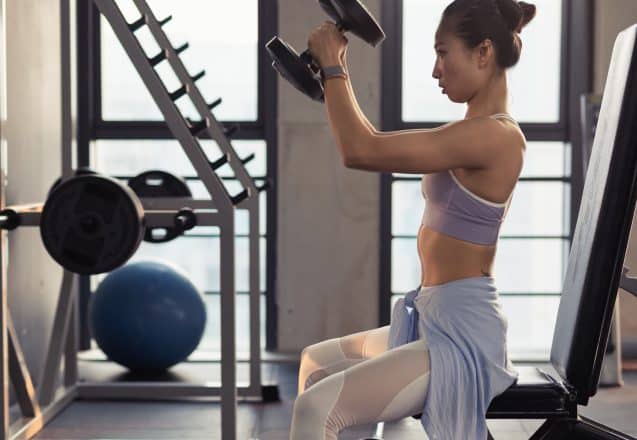
 People exercise for many reasons. Some like the energy it gives them or the exhilaration felt after working out hard. Others appreciate the changes it makes in their bodies and how good they look. Most people know that working out also provides health benefits when it's done regularly. Even when people exercise to lose weight, better health is often one of the reasons for weight loss. While seeing body changes doesn't happen overnight, you'll often notice more energy relatively quickly and feel less stress almost immediately after a workout. That's because exercise is a stress buster. It burns off stress hormones and sets your body back to normal.
People exercise for many reasons. Some like the energy it gives them or the exhilaration felt after working out hard. Others appreciate the changes it makes in their bodies and how good they look. Most people know that working out also provides health benefits when it's done regularly. Even when people exercise to lose weight, better health is often one of the reasons for weight loss. While seeing body changes doesn't happen overnight, you'll often notice more energy relatively quickly and feel less stress almost immediately after a workout. That's because exercise is a stress buster. It burns off stress hormones and sets your body back to normal.
 While working out is an important part of weight loss and fitness, nutrition also plays an important role. We have local farmers in Lakeland, FL, that grow some of the healthiest options, such as leafy greens. You get many health benefits from adding leafy greens to your diet. They're high in fiber and water content, so they're filling, yet have only a few calories, improving weight loss potential. Depending on the green, there are a wide variety of nutrients, too. The potassium in leafy greens like spinach can help reduce bloating, relieving you of excess water weight.
While working out is an important part of weight loss and fitness, nutrition also plays an important role. We have local farmers in Lakeland, FL, that grow some of the healthiest options, such as leafy greens. You get many health benefits from adding leafy greens to your diet. They're high in fiber and water content, so they're filling, yet have only a few calories, improving weight loss potential. Depending on the green, there are a wide variety of nutrients, too. The potassium in leafy greens like spinach can help reduce bloating, relieving you of excess water weight.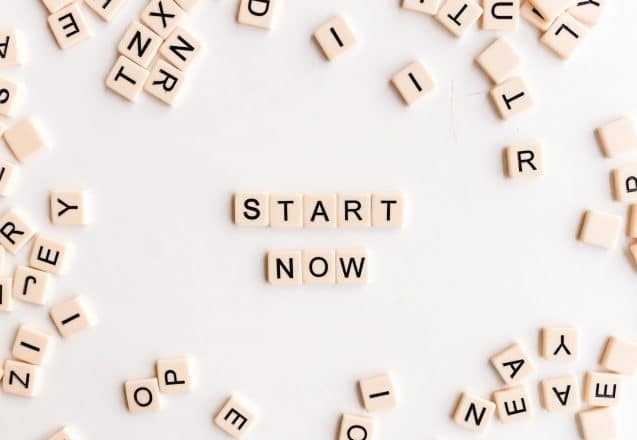
 No matter what your age or gender, there are a lot of reasons to start working out this year. If you live in Winter Haven, FL, it's even easier to increase your activity than it is in colder climates. Walking more is one way to increase your activity and any increase is good, but is walking enough? You need more than just cardio and lower leg strength to be truly fit, which is why you should make this year devoted to your health and start working out to round out your fitness program.
No matter what your age or gender, there are a lot of reasons to start working out this year. If you live in Winter Haven, FL, it's even easier to increase your activity than it is in colder climates. Walking more is one way to increase your activity and any increase is good, but is walking enough? You need more than just cardio and lower leg strength to be truly fit, which is why you should make this year devoted to your health and start working out to round out your fitness program.
 Staying in shape can be difficult for busy people, but it's those same people that will benefit from it most. Maintaining a crowded schedule requires extra energy, which you'll have if you workout regularly. Busy people often are under stress, another reason is that the busier you are, the more important it is to exercise. Exercise is a stress buster. It burns off the hormones of stress and replaces them with ones that make you feel good.
Staying in shape can be difficult for busy people, but it's those same people that will benefit from it most. Maintaining a crowded schedule requires extra energy, which you'll have if you workout regularly. Busy people often are under stress, another reason is that the busier you are, the more important it is to exercise. Exercise is a stress buster. It burns off the hormones of stress and replaces them with ones that make you feel good.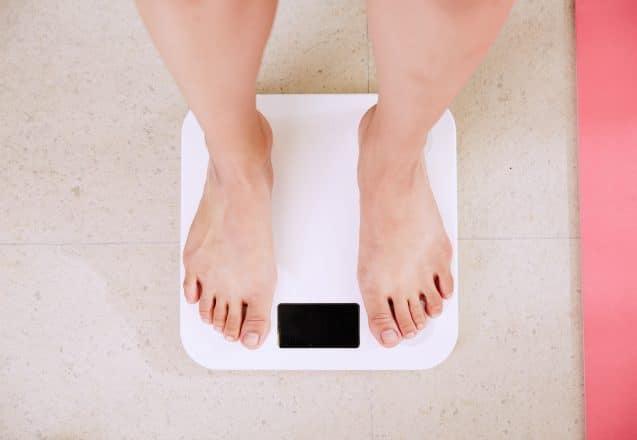
 A lot of people focus on losing weight to get healthier, and sometimes do it to excess. They fret if they've gained a pound and get ecstatic when they've lost one. While losing weight is an excellent goal, in the general scheme of things, it doesn't matter, especially if you're losing inches. When you stay the same weight, but shed inches, it means you're building muscle mass. Muscle tissue weighs more per cubic inch than fat tissue does, so even if you don't lose a pound, but change your body's composition to more muscle mass, you'll be thinner and wear a smaller size.
A lot of people focus on losing weight to get healthier, and sometimes do it to excess. They fret if they've gained a pound and get ecstatic when they've lost one. While losing weight is an excellent goal, in the general scheme of things, it doesn't matter, especially if you're losing inches. When you stay the same weight, but shed inches, it means you're building muscle mass. Muscle tissue weighs more per cubic inch than fat tissue does, so even if you don't lose a pound, but change your body's composition to more muscle mass, you'll be thinner and wear a smaller size.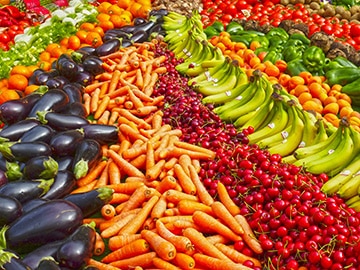
 Changing your diet to a healthier one is important for both your health and to help you lose weight, but what foods are best? In Winter Haven, FL, you hear all sorts of stories of crazy diets and stories of super foods that magically make you thinner. Unfortunately, there is no one magical food. While some foods will help boost weight loss, that food has to be part of a healthy diet if you want to be successful.
Changing your diet to a healthier one is important for both your health and to help you lose weight, but what foods are best? In Winter Haven, FL, you hear all sorts of stories of crazy diets and stories of super foods that magically make you thinner. Unfortunately, there is no one magical food. While some foods will help boost weight loss, that food has to be part of a healthy diet if you want to be successful.